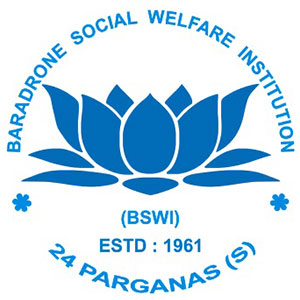Education & Life Determination
“Knowledge is power. Information is liberating. Education is the premise of progress, in every society, in every family.”– Kofi Annan.

Over a period of about four decades, BSWI has reached to more than one lakh families in remote rural areas with these programs and we have facilitated more than two lakhs children directly and indirectly, thirty-five thousands adolescents with a focus on the vulnerable girls, fifty-seven adult women and men. Besides, we have reached to more than ten thousand farmers, nine thousand adult illiterate men, three thousand four hundred rural artisans and many others with family life education and professional education.
Today, BSWI has a focus on preventing early marriages in villages where the light of awareness has not reached to stand by the adolescent girls with supportive education system to defer their teen marriages. Setting up of rural Bridge Schools in collaboration with the government and private charities has been achieved by BSWI. These schools teach the adolescent girls during their leisure time and for those who have never-been-to-school and even divorced adolescent girls to strengthen their capacity through education and ensure their rights over their bodies and issues.

Four sub-sectors are prominent in our strategies to achieve societal education in a broad sense:
- Preprimary education;
- Non-formal education;
- Supplementary/Bridge education; and
- Functional Literacy & Awareness

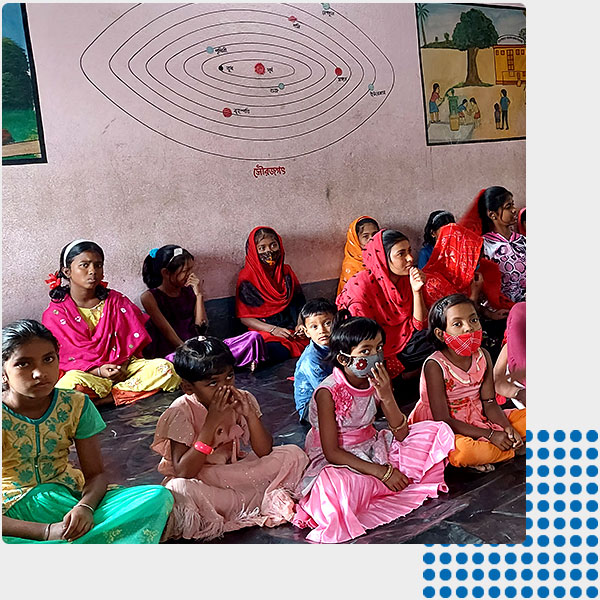
Pre-Primary Education Program (PPEP)
BSWI is currently running 12 PPEP centers in 12 villages in Malda district that are focused on tribal children and SC/OBC children. The program is based on joyful learning, fun and in playful environment, so that the children are admitted in the formal schools and do not come back being dropouts. 310 children of the age-range 4-5 years are enrolled in the PPEP program.
Our PPE level programs are the centre or school-based, and is designed to meet the educational and developmental needs of children at least four years of age, and we have staff that are adequately trained to provide an educational program for the children. The educational properties of our pre-primary education system are characterized by interaction with peers and educators, through which children are improving their use of language and social skills, and starting to develop logical and reasoning skills.

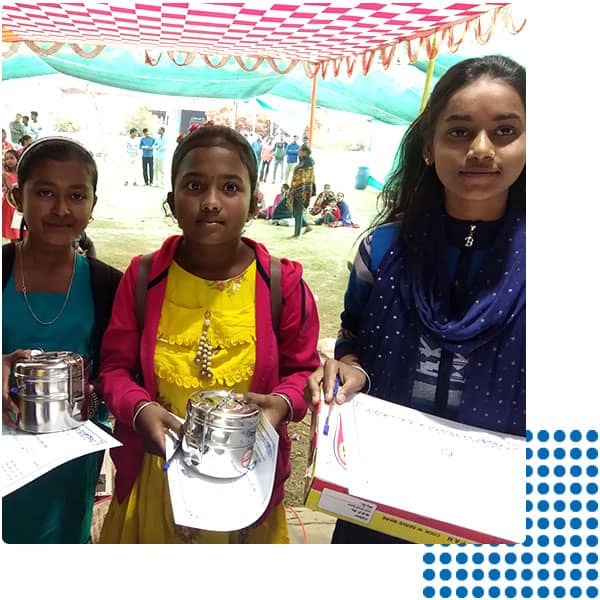
BSWI Non-Formal Education (NFE) Program
We provide NFE in order to guarantee the right of access to education for all. We cater to persons of 6-14 age-groups but do not necessarily apply a continuous pathway structure; it is usually short in duration and/or low-intensity; and it is typically provided in the form of short courses, workshops or seminars. BSWI’s NFE sometimes covers education for out-of-school children, as well as programs on life skills, and social or cultural development.
BSWI is organizing 10 NFECs in 10 villages for 285 learners who are dropouts or very much irregular in the formal schools. Many of them are child labourers and work as maid servants. So far, since the year of 1988, BSWI has re-admitted and mainstreamed more than 35000 children in the formal schools from different villages of four districts amongst six blocks.
BSWI Bridge Education Program

to the world beyond their community.
The PROCHESTA (meaning Efforts) program helps underprivileged girls’ complete high school and blossom into socially responsible, independent and mature adults. The program provides academic and life skills support for girls with the goal to improve school attendance and reduce incidences of early marriages. The program largely caters to young girls in the age group 12-16 who are forced to drop out of school. Under the program, we provide academic and life skills support to underprivileged girls with the goal to improve school attendance and reduce incidences of early marriages. This holistic approach goes a long way towards prevention of child sexual abuse, early child marriage, access to Govt. schemes, financial inclusion, providing health and nutrition support and imparting life skills through focused activities and exposure trips to develop self-confidence, positive self-image, independent expression and health and hygiene awareness.
The NIVEDITA (meaning ‘Devotee’) education program was established to provide more than 200 enrolled children’s educational support. The program works with out-of-school children and brings them to the educational level of their peers before mainstreaming them into government schools. It also improves the academic performance of children already in-school through supplementary tutoring. Through the initiative, we try to impact the school going and out of school children through a Remedial Education Program in seven villages centre, which has been equipped with teaching learning resources, trained community teachers and community linkages so that they can demonstrate outcomes which are a direct output of the teaching-learning activities and other outcomes which are linked to the community and indirectly influence education indicators. One of the important goals has been to increase enrolment and provide quality education to children from tribal villages who are out of school through an accelerated learning level program with a goal to enroll them in school. We provide relevant teaching and learning materials and approaches that are student-centered, promotes creativity, stimulate self-paced learning for improved learning outcomes, children have witnessed holistic all round development of children with fundamental life skills development.
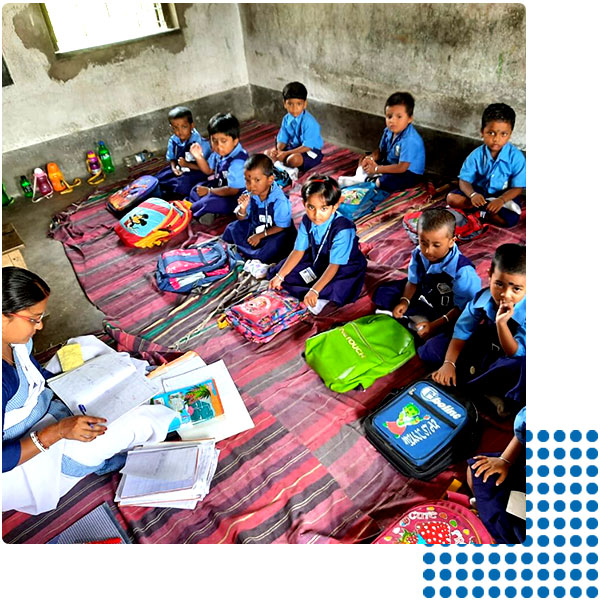
Pre-Primary School
BSWI’s Pre-school comprises Early Childhood Care and Education (ECCE) enrolls children in lower kindergarten (LKG – three to four yours olds) and upper kindergarten (UKG – four to five year olds). The Pre-primary education is the initial stage of organized instruction, designed primarily to introduce very young children to a school-type environment, that is, to provide a bridge between home and a school-based atmosphere.
BSWI’s educational properties of pre-primary education are characterized by interaction with peers and educators, through which children improve their use of language and social skills, and start to develop logical and reasoning skills. Children are also introduced to alphabetical and mathematical concepts, and encouraged to explore their surrounding world and environment. Supervised gross motor activities (i.e. physical exercise through games and other activities) and play-based activities are used here as learning opportunities to promote social interactions with peers and to develop skills, autonomy and school readiness.

Primary School
BSWI’s Primary School was set up with the intention of providing subsidized or free, quality education to children with basic infrastructural facilities. The Primary School is run by BSWI with the following objectives: (a) holistic and integral development of children in academic, physical, emotional, social, moral and aesthetic spheres; (b) promoting and strengthening inclusive environment and Inclusive practices in the School; (c)making the school stand for centres of excellence and innovation; (d) establishing strong community- school linkages; and (e) improvement of the Teacher Professional Development.
Vision of BSWI’s Model Primary School
“Creating democratic and peaceful classrooms ensuring freedom from fear, anxiety and discrimination, with children’s total participation in interesting and thought provoking learning activities; teachers playing the facilitator’s role, continuous assessment of children’s performance, dynamic community participation, effective and supportive monitoring system for an all-round development of children”.


BSWI Functional Literacy & Awareness Program
BSWI does not have any set-up education centers for Functional Literacy & Awareness Center. We have informal, group-based and peer educational functional literacy systems so that the members can acquire functional education and socio-economic awareness whenever they sit in groups of the same type of professions – like producers’ group meetings, SHG meetings, Farmers’ Cooperative meetings and seminars etc. Currently we are working in this program in 42 villages in the North and South Bengal blocks with a focus on the tribal communities. We are covering 870 persons and in a two year-timeframe 310 persons have achieved functional literacy.
Functional literacy is assessed by BSWI with classifications of literacy according to three levels as:
- Below Basic Literacy: reading and writing words and numbers in very simple documents;
- Basic Literacy: performing simple skills to understand short texts; and
- Intermediate Literacy: performing challenging skills to understand long texts (like summarizing a long article; placing an order and calculating the cost) etc.
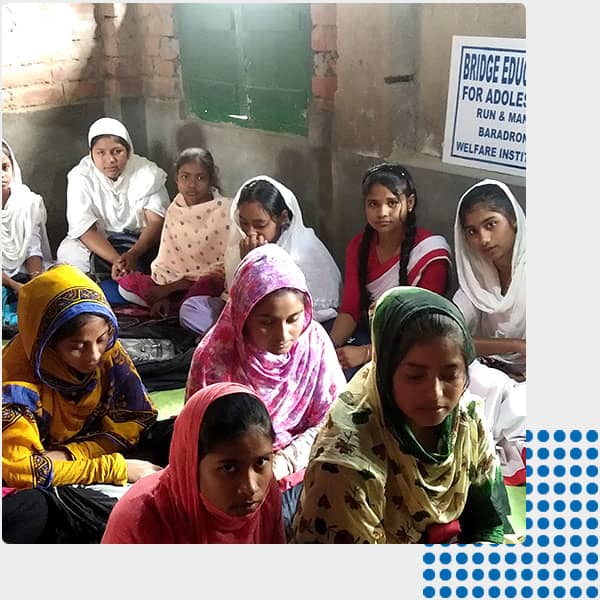
Impacts of Our Movement in the Lives of Girls and Women
We work with girls of all ethnic groups of our project areas up to 18 years of age who are from the poverty-stricken and backward communities. We also work with young women of 18 – 35 years of age who are vulnerable and are representing the poorest communities of our project areas. The rural girls are falling prey to the lucrative trafficking business in South 24 Parganas district in West Bengal that has emerged as a result of extreme poverty, desperation, lack of support and opportunities. The girls are often school dropouts, forced for early marriages and teen pregnancies.
The adolescent girls are facing painful trafficking and abuses in various fronts like atrocities, dowry-related deaths, unwanted pregnancies and frequent child birth. We work with the school dropout girls in the field of Bridge Education Program, Awareness Generation Programs, negotiation with the local statutory bodies and administration and the local residents to spread the messages on the evils of early marriages, ante-trafficking, addiction and atrocities on women that are the most prominent happenstances of the project area.
Our reintegration work for the adolescent girls, our community group members constantly put pressures on local schools to re-enroll the students, who were either dropouts or non-school goings. BSWI makes sure that orthodox families join the local level meetings conducted by the PRI – Panchayat (village administration) to make sure they are not stigmatized and encourage girls’ education for their well-beings. BSWI has linked the families of the girls with different BSWI’s and government-sponsored schemes like health schemes, vocational trainings, livestock farming and household enterprises and small businesses. BSWI has provided skill training and supported with financial assistance for varieties of income generation programs.


Classroom of Child Brickfield Workers
Among the 6000 migrant workers in Diamond Harbour brick-kilns, 87 % belong to households that have at least one brick-kiln worker, working adults of both genders (20-59 years) and a child (less than 18 years). This implies that a large majority of brick-kiln migrants move to the kilns along with their families and children, as also we have seen here in Diamond Harbour brick kilns. We have set up 5 Pre-primary Education Centers for 125 infants of the working members (below 6 years) ; and we have set up 5 Non-formal Education Centers for 125 children aged 6 years to 8 years. We are providing nutritional food (milk, bread, and other food) for the children and we are providing them Health check-ups and curative cares at free of costs. We also arrange exposure visits for the children for enhancing their knowledge about the important sights. We provide play materials, musical instruments and recreational materials for the children and we organize Child Day Function in the area. Our program consists of education tests and examinations.
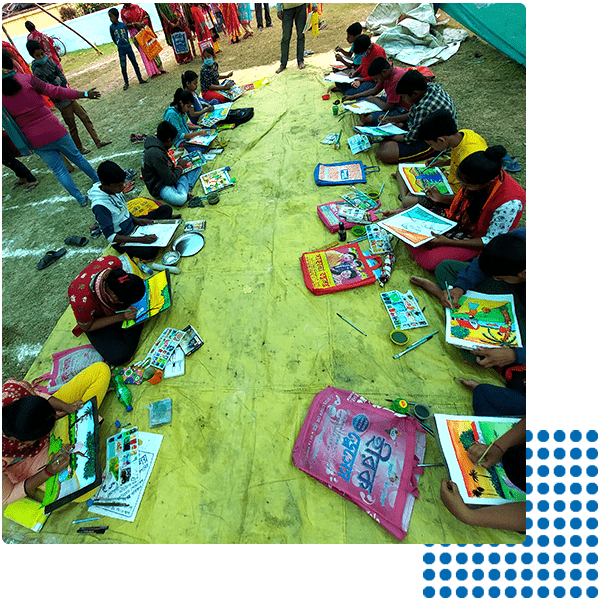
Annual Games & Sports Competition for Child Brickfield Workers
The children working in the brick fields are encouraged to participate with the general children on social networks and programs that reduce the barricades of their socialism. Games & Sports, Cultural programs, drawing activities etc are organized by BSWI for the mental and education improvement of the working children.

